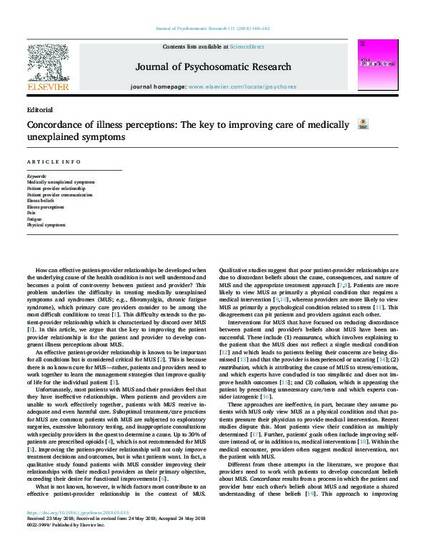
Article
Concordance of illness perceptions: The key to improving care of medically unexplained symptoms
Journal of Psychosomatic Research
Document Type
Editorial
Disciplines
Publication Version
Published Version
Publication Date
8-1-2018
DOI
10.1016/j.jpsychores.2018.05.015
Abstract
How can effective patient-provider relationships be developed when the underlying cause of the health condition is not well understood and becomes a point of controversy between patient and provider? This problem underlies the difficulty in treating medically unexplained symptoms and syndromes (MUS; e.g., fibromyalgia, chronic fatigue syndrome), which primary care providers consider to be among the most difficult conditions to treat. This difficulty extends to the patient- provider relationship which is characterized by discord over MUS. In this article, we argue that the key to improving the patient provider relationship is for the patient and provider to develop congruent illness perceptions about MUS.
Rights
Works produced by employees of the U.S. Government as part of their official duties are not copyrighted within the U.S. The content of this document is not copyrighted.
Language
en
File Format
application/pdf
Citation Information
Lisa M McAndrew, Myra L. Friedlander, L. Alison Phillips, Susan L. Santos, et al.. "Concordance of illness perceptions: The key to improving care of medically unexplained symptoms" Journal of Psychosomatic Research Vol. 111 (2018) p. 140 - 142 Available at: http://works.bepress.com/lalison-phillips/18/

This editorial is published as McAndrew, Lisa M., Myrna L. Friedlander, L. Alison Phillips, Susan L. Santos, and Drew A. Helmer. "Concordance of illness perceptions: The key to improving care of medically unexplained symptoms." 111 (2018): 140-142. DOI: 10.1016/j.jpsychores.2018.05.015.